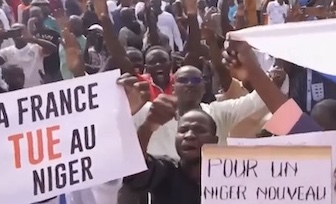Burkina Faso, Mali, and Niger to Quit ICC (Anti-African Bias)
Sawako Uchida and Chika Mori
Modern Tokyo Times

In recent years, the Sahel region has experienced continued upheaval, as Burkina Faso, Mali, and Niger rejected the authority of ECOWAS (Economic Community of West African States) and pushed back against France’s colonial legacy. In response, the three nations formed the Alliance of Sahel States and ordered the withdrawal of French armed forces.
The charter signed states, “Any attack on the sovereignty and territorial integrity of one or more contracted parties will be considered an aggression against the other parties.”
It is therefore unsurprising that, several years later, Burkina Faso, Mali, and Niger are now withdrawing from the International Criminal Court (ICC), which they have denounced as a tainted “instrument of neo-colonialist repression.”
The BBC reports, “The three military-led countries issued a joint statement, saying they would not recognise the authority of the UN-backed court, based in The Hague.”
In a joint statement, the three nations uttered, “The ICC has proven itself incapable of handling and prosecuting proven war crimes, crimes against humanity, crimes of genocide, and crimes of aggression.”
Echoing the stance of Rwanda and other defiant voices on the continent, Burkina Faso, Mali, and Niger have condemned the ICC for its entrenched anti-African bias. In a bold rejection of external interference, the three Sahel nations declared their intent to establish “‘indigenous mechanisms for the consolidation of peace and justice,” reclaiming the right to define justice on their own terms.”
“Since its establishment in 2002 with the mandate to prosecute genocide, crimes against humanity, war crimes, and acts of aggression, the ICC has opened 33 cases — all but one targeting African nations. This glaring imbalance has not gone unnoticed. While the ICC claims impartiality, powerful actors involved in devastating conflicts in places like Sudan and Yemen have conveniently escaped its scrutiny, shielded by geopolitical privilege and selective justice.
Likewise, nations that supply weapons – for example, America and the United Kingdom supply military arms to Gulf Powers involved in the war in Yemen – equally evade the wrath of the ICC. Therefore, it is abundantly clear that the ICC is biased by its actions, and Western powers also seek to manipulate against the Russian Federation while ignoring their collective actions in wars (funding wars and providing military support via back channels).
Lee Jay Walker (Modern Tokyo Times analyst) says, “Likewise, nations that funnel weapons into warzones — notably the United States and the United Kingdom, which arm Gulf powers embroiled in the brutal war in Yemen — consistently evade the ICC’s reach. Despite their direct complicity in fueling conflict, they remain untouched by international indictment. The message is unmistakable: the ICC’s hand is swift against the weak, but conveniently restrained when it comes to the powerful. Its selective prosecutions reveal not only a glaring double standard but also a troubling alignment with Western interests — targeting adversaries like the Russian Federation, while turning a blind eye to the West’s own entanglements in global bloodshed, covert arms deals, and proxy wars.”

http://moderntokyotimes.com Modern Tokyo Times – International News and Japan News
http://sawakoart.com – Sawako Utsumi’s website and Modern Tokyo Times artist
https://moderntokyonews.com Modern Tokyo News – Tokyo News and International News
PLEASE JOIN ON TWITTER
https://twitter.com/MTT_News Modern Tokyo Times
PLEASE JOIN ON FACEBOOK